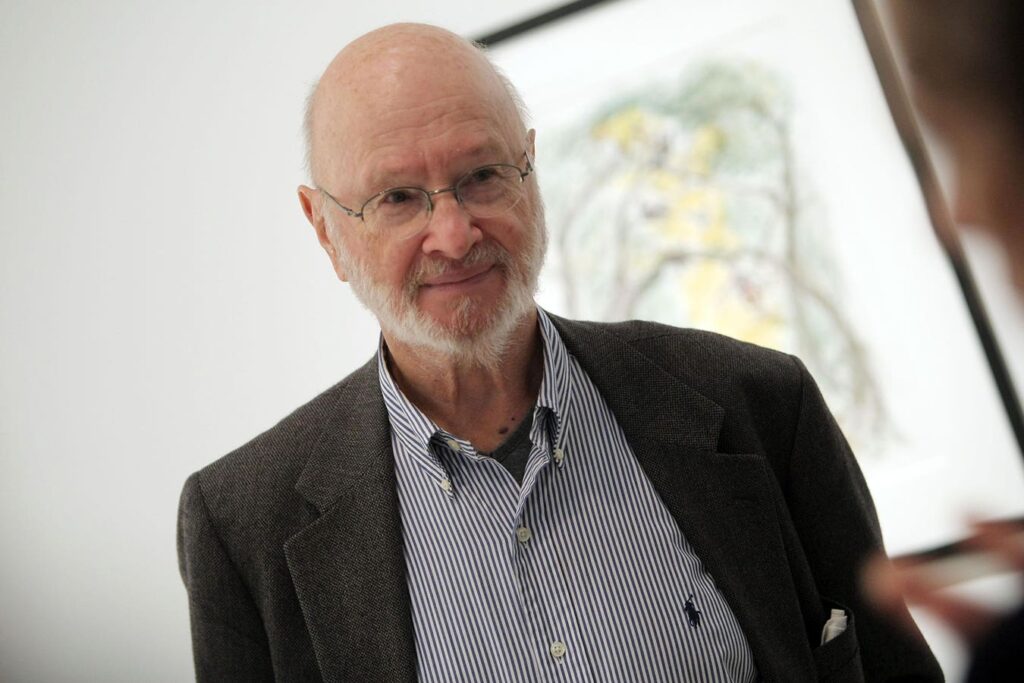NEW YORK – NOVEMBER 15: Artist Jules Feiffer (C) discusses his piece on display during a press … [+]
Getty ImagesJules Feiffer, a cartoonist, author, playwright, and political satirist who documented and defined a particular strain of 20th century Jewish-American experience in a career that extended over nine decades since the 1940s, died today at his home in upstate New York. He was 95.
Feiffer was just a teenager when he landed a job as a shop assistant to Will Eisner, one of the foundational figures of the American comics industry and artform, in 1946. Within a few years, he was collaborating with Eisner on scripts for the landmark series The Spirit, crafting witty O. Henry-like fables and snappy dialogue, while developing his style and voice.
Cartoonist and Social Satirist
Cartoonist and satirist Jules Feiffer, New York City, US, February 1959. (Photo by Ben Martin/Getty … [+]
Ben Martin/Getty ImagesIn 1956, Feiffer joined the fledgling alternative weekly newspaper The Village Voice as its cartoonist, debuting a strip first titled “Sick Sick Sick,” later “Feiffer’s Fables,” and finally “Feiffer.” Drawn with a spidery expressionistic line and featuring a cast of characters including the neurotic Bernard, brutish Huey and the graceful Dancer, the strip satirized social and political issues and gave voice to liberal humanist views during the culturally conservative 1950s. By 1959, his work was nationally syndicated, appearing in publications such as The Boston Globe, Los Angeles Times, The New Yorker, Esquire, Playboy, and The Nation.
The strip was collected in paperbacks in the 1960s, some of the earliest examples of comics aimed at adult readers appearing on the bookshelf. In 1961, he did the illustrations for The Phantom Tollbooth by Norton Juster, which reached a generation of children.
His work became more explicitly political as the 1960s unfolded, and was embraced by liberal advocates for Civil Rights and opponents of the war in Vietnam. He is considered an influence on Garry Trudeau (”Doonesbury”) and others who incorporated political perspectives into their daily strips. Feiffer won the Pulitzer Prize for editorial cartooning in 1986. In 1997, he was the first cartoonist to have his work appear on the editorial page of The New York Times.
Feiffer began adapting the themes and characters from his comic strips into plays, including Little Murders” (1967), “Feiffer’s People” (1969), and “Knock Knock” (1976). The sardonic, neurotic, introspective style of humor reflecting the ambivalence of postwar Jewish-American aspirations for assimilation, was reflected in the works of comedians from Woody Allen to Jerry Seinfeld.
Comics and Graphic Novel Pioneer
In 1965, Feiffer wrote a long essay for Playboy called “The Great Comic Book Heroes,” nostalgically reminiscing about the early days of Superman, Batman, Wonder Woman and Captain America in the 1940s, and rooting their origins clearly in the sociology of Depression-era first generation Jewish-American culture. The essay became the basis for a book of the same title which also included some of the first reprints of American comic books in book form. The Great Comic Book Heroes is today considered the seminal example of comics scholarship, and Feiffer lending his ascendent cultural clout helped to dignify the art form, laying the groundwork for its later growth and development.
When comics began their evolution into graphic novels in the late 1970s, Feiffer was one of the pioneers of the new format, alongside his old mentor Will Eisner. Feiffer’s 1979 work Tantrum, the story of a 42 year-old man starting his life over as a 2-year old told in a series of single-frame images, was one of the first graphic novels from a major publisher (Alfred A. Knopf), and one of many that Feiffer produced over the succeeding decades.
In 2004, he was inducted into the Will Eisner Comics Hall of Fame.
Award-winning Author and Screenwriter
Feiffer authored more than 35 books in various formats. His first novel, Harry, the Rat With Women, was published in 1963, and a second, Ackroyd, in 1977. Starting in 1993, Feiffer began writing and illustrating children’s books, with several winning awards.
Feiffer’s cultural impact also extended to the film industry. His screenplay for “Carnal Knowledge” (1971), directed by Mike Nichols, received critical acclaim for its raw portrayal of relationships. He penned the screenplay for “Popeye” (1980), directed by Robert Altman, capturing the weird whimsy of the comic strip in one of the more overlooked screen adaptations of comic-based work.
Feiffer was elected to the American Academy of Arts and Letters in 1995, received the Creativity Foundation’s Laureate in 2006, and garnered a Lifetime Achievement Award from the Writers Guild of America in 2010.
Personal Life
Feiffer was married three times and had three children, Julie, Halley and Kate. His daughter, Halley Feiffer, is an actress and playwright, and another daughter, Kate Feiffer, is an author and playwright. In September 2016, he married freelance writer JZ Holden in a ceremony that combined Jewish and Buddhist traditions.
Legacy
Jules Feiffer’s life spanned the arc of the American Century, from the Great Depression to the second inauguration of Donald Trump, an event he was unlikely to have viewed with great enthusiasm. He was present at the creation of comic books as a creative and commercial enterprise, learning his trade from one of the great masters, and eventually becoming the pivotal figure in elevating comics’ status in the culture. He gave voice to the midcentury Silent Generation, confronting the prejudices, sexual repression, hypocrisy and foibles of the culture with wit and courage, and made his mark on every popular artform.
He packed several lifetimes worth of accomplishments into the generous time he had on earth, and was reportedly active up until the end of his life despite failing health and eyesight. His great work now done, let’s celebrate with one final dance.
A Dance to Art by Jules Feiffer (1929-2025)
Art by Jules FeifferRead the full article here


